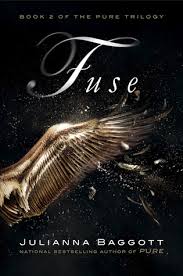The second novel in the “Pure Trilogy,” Fuse was all that I’d hoped for and more. The heartbreakingly scarred world set up in Pure was further explored by the perspectives of Pressia, Partridge, El Capitan and Lyda as they struggle to define themselves on their own terms and unravel the secrets of the world they’ve inherited.
Partridge, having left the Dome and the influence of his power hungry father, is determined to find out the truth behind the Swan and his parents’ past; however, his father refuses to let him escape and, to save the people he cares about, Partridge is forced to return. Whilst Partridge confronts the lies and dark secrets inside the Dome, Pressia and the others continue their search for answers. The romance blossoming in the first novel between Pressia and Bradwell is compromised, partially due to Pressia’s own fears to love, but also their conflicting motives. Bradwell “wants to know the truth about the world” whereas Pressia “wants to know only the truth about herself in that world” (72). The romance between Partridge and Lyda is more fruitful, but their education has ingrained certain beliefs that Lyda is determined to escape so when Partridge returns to the Dome, she chooses to remain outside.
Personally, my favourite characters are El Capitan and his brother Helmud. In Pure, El Capitan was an angry, frustrated and violent young man, burdened with a brother who seemed to repeat mindlessly El Capitan’s own words. However in Fuse their relationship becomes far more complex as El Capitan recognises Helmud’s constant repetitions, “usually…just a dim-witted echo,” sometimes mean something (27). Helmud even appears to have a sense of humour, altering El Capitan’s “Time to eat, brother,” to “Time to eat brother.” Commas save lives. Helmud goes from being a parasite to being a brother, the two finding a symbiotic balance that ensures their survival.
While Pure was focused on world building, Fuse focuses on character development and it is brilliantly executed. Through these flawed and very human characters, Baggott tackles the themes of gender, faith and identity on multiple levels, using symbolism, repetition and imagery to ensures a well-knit narrative. I haven’t been so throughly hooked by a series in a long while and it won’t take me long to devour the final book in the series, Burn.

